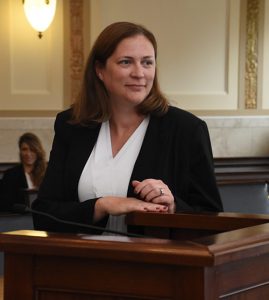Mary Martin on Drunk Driving and Birchfield v. North Dakota

The Supreme Court of the United States recently issued an opinion in a OVI/DUI/Drunk Driving case that will affect drivers in Ohio. Birchfield v. North Dakota, 579 U.S. (2016).
Opinion by: Mary Martin
In an analysis of three separate cases, the Supreme Court has ruled that breath tests in drunk driving cases are searches incident to arrest and thus no warrant is needed. However, a blood test to determine the concentration of alcohol and/or drugs in your body is not a search incident to arrest and thus a warrant must be obtained before compelling an individual to submit to blood test. The analysis in the majority opinion focuses on the fact that a breath test does not implicate one’s privacy concerns and it is minimally intrusive. A blood test, however, is very intrusive and the State can get far more information than just one’s blood alcohol content from the sample the State obtains and then keeps.
The Court struck down North Dakota and Minnesota’s additional separate criminal offenses for refusing to take a test. The Court held that civil penalties (such as additional driver’s license suspension time) and evidentiary consequences (such as favorable jury instructions) are permissible for someone that refuses a test: “there must be a limit to the consequences to which motorists may be deemed to have consented by virtue of a decision to drive on public roads.”
How does this decision affect drivers in Ohio?
As in all other states, Ohio has an implied consent law. Implied consent basically states that because you drive on the roadways in Ohio you are subject to Ohio’s laws. One of those laws is that by driving on Ohio’s roadways you have consented to take a test to determine if your blood alcohol levels are above the legal limit, should you be arrested for suspicion of drunk driving. Ohio’s laws leave it up to the arresting police officer as to what test or tests you are to consent to. If you refuse whatever test or tests the officer requests you are subject to stiffer civil penalties and if found guilty of drunk driving and refusing to take the test a stiffer sentence.
Ohio also has in their laws, a little used and little understood forced blood draw provision. In Ohio, officers can use whatever force reasonably necessary to obtain a blood sample of a subject arrest for drunk driving. There is no clear-cut explanation of the term “whatever force reasonably necessary. “Does this mean the officer could punch someone in the face to obtain a blood sample? (Probably not.) Does it mean that they can strap someone into a restraint chair and get a blood draw? (Maybe.) Does it matter if the person who is drawing the blood is a trained phlebotomist or not? (We hope.) All these questions have not been answered.
So either because no one knows what the statute means or because there are common-sense concerns on not only how to implement this provision but how this would affect someone’s rights, the provision is little used. Although the Supreme Court in Birchfield doesn’t address Ohio’s forced blood draw provision, the Court clearly holds that police must have a warrant to obtain blood.
The more interesting analysis will be how Birchfield affects Ohio’s sentencing laws. Ohio’s longer driver’s license suspension for refusals and the favorable jury instruction will likely stay in place. The increased penalty for someone that is convicted of the drunk driving and refusing will require additional analysis. Birchfield states that the State can’t make the refusal alone a separate criminal offense, however, it does not specifically address increased sentencing penalties for refusals.
Another interesting ramification of this case for future OVI/DUI/Drunk Driving is the makeup of the Court. Justices Sotomayor and Ginsburg, some of the more liberal justices, opined that a breath test is not a search incident to arrest and that there should not be a categorical exception to the warrant requirement for breath tests. These Justices possibly would require warrants for all breath tests, too! Justice Thomas, a more conservative, stated that both breath and blood testing should be allowed without a warrant due to the exigent nature of the evidence being sought. With all the rumors of various Justice’s retiring in the near future and the current open position on the Court, it will be interesting to see what direction the court goes in drunk driving cases in the very near future.
